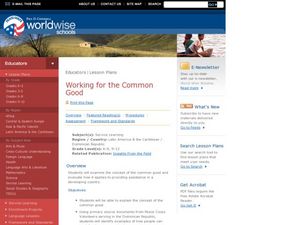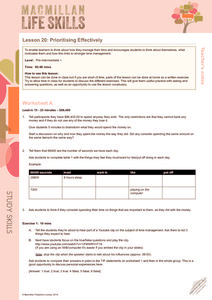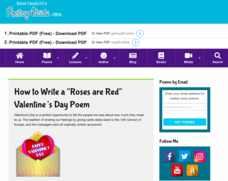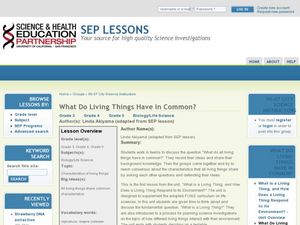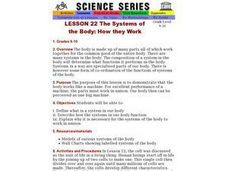Curated OER
Synonyms - How Authors Make Comparisons
A very good 13-slide presentation on similes and metaphors is here for you. It introduces young poets to each term, gives examples, and prompts them to work together to identify similes and metaphors in several different sentences.
National Energy Education Development Project
Energy Works: Yes, Indeed it Does!
Moving from its definition to how it moves and its different types, scholars see different examples and then move into its application and use in everyday lives, in an energy-based presentation.
Curated OER
Working for the Common Good
Students discuss the concept of the common good. Using primary source documents, they read accounts from volunteers in the Dominican Republic and discuss how they work for the common good. They reflect on the topic in their journals to...
New Vista Middle School
Hyperboles
Turn hyper bowls into hyperboles that will take away the breath of your principal and learners with the knowledge available in this presentation. The PowerPoint provides very clear and accurate information that breaks down how hyperboles...
Berkeley Engineering and Mentors
Egg Drop
How do different shapes affect the outcome associated with hard impact? All you need is an egg and some recycled materials to find out. Kids experiment to understand how airbags work to lessen the impact of two different types of...
Curated OER
When Things Fall Apart
Students examine the impact of colonialism on African nations, researching and analyzing post-colonial literature from those countries. They develop and present a creative display of their novel and its historic parallels.
Curated OER
Energy, Work, and Power
In this energy worksheet, students review the equations to solve for work and power. Then students complete 10 matching, 14 fill in the blank, and 10 problems to solve.
Curated OER
Explaining How Things Work
Students will focus upon learning how to write an essay based upon observations that are made at a museum. After watching a demonstration or learning how to do something, students write an essay explaining the process to someone who has...
Curated OER
How Well Do You Know A Tale of Two Cities?
Are you working on a Charles Dickens unit? Ten multiple-choice questions from A Tale of Two Cities will do the job checking reading comprehension. Use this resource as a quick diagnostic tool after reading the novel as a class.
Macmillan Education
Prioritising Effectively
How do you determine the things you must do during your day from those that you want to do, or are willing to put off? Time management and prioritizing effectively are the focus of this life skills lesson, which includes worksheets,...
Poetry4kids
How to Write a “Backward” Poem
If you like poetry, wait till you try backward poetry! Young writers read Shel Silverstein's "Backward Bill" before writing their own funny poems that are full of backward imagery and phrasing.
Casimir Middle School
Biological Classification Worksheet
Classify living things with a set of worksheets that has pupils sorting and indentifying living and non-living things. Learners use the worksheets as a basis for finding their answers.
Poetry4kids
How to Write a Limerick
Add a little fun and fancy to English language arts with an activity that challenges scholars to write a limerick. Authors follow five rules in order to compose an original poem that contains a specific rhyme scheme.
Poetry4kids
How to Write an Alliteration Poem
Learners follow five steps to compose an alliteration poem. They choose one consonant and brainstorm as many nouns, verbs, and adjectives they can think of to create rhyming sentences that come together in a poetic fashion.
Maryland Department of Education
The Concept of Diversity in World Literature Lesson 9: Debating Imperialism
To gain an understanding of Imperialism, class members read Rudyard Kipling's poem, "The White Man's Burden" and Mark Twain's essay, "To the Person Sitting in Darkness." Groups compare these perceptions of non-white cultures with the...
CK-12 Foundation
Ballistics Tests
How did scientists measure the speed of incredibly fast things before the invention of high-speed photography? Scholars virtually perform ballistics tests to discover the process. They control the rifle type, bullet mass, and target...
Poetry4kids
How to Recite a Poem like an Expert
Don't just read a poem, recite a poem! Add speaking skills to a poetry unit with an activity that promotes successful poem recitation. Scholars choose a poem then recite it with the help of several tips and videos.
Poetry4kids
How to Write a “Roses are Red” Valentine’s Day Poem
Compose a Valentine's Day poem! Practicing their rhyming skills, scholars follow the traditional format to create a happy poem for a friend or family member.
Poetry4kids
How to Write an Apology Poem
Put a silly spin on making amends with an apology poem. Budding poets think of a time they were made to apologize although they didn't mean it. They then turn their experience into a poem that offers details and ends with an explanation...
It's About Time
Energy Flow in Ecosystems
Emerging biochemists more fully understand the flow of energy in ecosystems as they explore the laws of thermodynamics and relate them to energy transfer in food chains. They also investigate heat loss from the human body and how...
Curated OER
Classifying Living Things
Learners identify how to classify living things. They classify various concepts including family members, kinds of clothing, numbers, shapes, and vocabulary words. They discuss how to classify various concepts and classify pictures of...
Curated OER
Wild Things - Texture And Pattern
Students implement textures and patterns in creating an imaginary Wild Thing, using the book and illustrations in Where the Wild Things Are by Maurice Sendak serve as Inspiration.
Curated OER
What Do Living Things Have In Common?
Students explore the concept of classification. In this classification lesson, students collaborate to create lists of living thing similarities in order to differentiate between living and non-living things. Students create a list of...
Curated OER
The Systems of the Body: How they Work
Students study what a body system is, how they function and how the systems work in unison.
Other popular searches
- How Things Work Lenses
- How Things Work Toaster
- Explaining How Things Work
- How Things Work" Odometer
- Explanation How Do Things Work
- How Things Work Odometer
- "How Things Work" Odometer




